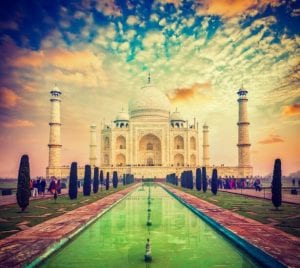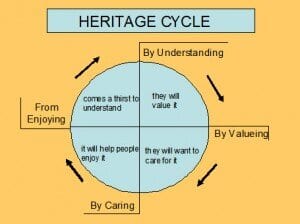Culture and heritage tourism plays a critical role in building the visitor economy and goes even beyond that. A recent survey showed that over 50% of respondents polled agreed that history and culture are strong influences on their choice of holiday destination.
Culture and heritage tourism is a fast-growing and high-yielding sector
Statistics also indicate that culture and heritage tourism continues to grow rapidly, especially in OECD and APEC regions. We estimate the direct global value of culture and heritage tourism to be well over $1billion dollars, with that of the Asia Pacific region being approximately $327 million.
It is already directly responsible for more than 50 million jobs in APEC countries. And what’s more, the indirect benefits of culture and heritage tourism are thought to be of the order of $1 billion and account for further 75 million jobs across the region.
There is no denying the fact that culture and heritage tourism tends to attract high-yield tourists. While global figures can be hard to obtain, all available statistics on tourism in various individual markets like the UK, New Zealand, Australia, India, etc. reveal a consistent pattern.
Culture and heritage tourists often stay longer and spend a lot more money in general than other tourists do. In fact, one study showed that a culture and heritage tourist spent as much as 38% higher per day and they stayed 22% longer overall compared to other kinds of travellers.

Taj Mahal, Indian Symbol
Although the statistical evidence doesn’t show consistency regarding repeat visitors, tourism data on United States’ Culture and Heritage visitors indicates that the level of repeat visitation amongst this group of travellers is higher than that of traditional tourists.
It builds engagement
Culture and heritage tourists usually visit cultural heritage attractions such as historic buildings and other historic attractions; archaeological sites; state, local, or national parks; art galleries or museums; concerts, plays, or musicals; ethnic or ecological heritage sites; and such attractions. These travellers say that these trips are more memorable than conventional holiday trips since they allow them to learn something new. This focus on learning skills and gain enrichment has been identified by Trendwatching as a core global trend in travel (and links to broader macro trends in consumer needs).

Culture and Heritage Tourism Cycle Grap
Culture and heritage tourists say they often extend their stay because of a heritage activity. The majority of these travellers stay overnight at local motels, hotels, bed, and breakfasts, or campgrounds. Culture and heritage tourists also tend to put more money back into the local economy, spending more than other kinds of tourists per trip. However these economic benefits are not the only reason why heritage tourism may be good for the community.
The benefits of culture and heritage tourism are amplified through the economy, so their impact is much wider than just the direct spending levels. As Simon Thurley of English Heritage has shown in his Heritage Cycle, heritage tourism has benefits that extend beyond the solely economic.
What are the benefits of heritage tourism?
Generally, the benefits of heritage tourism can be categorized into three groups: economic, social, and environmental. As they tend to be the highest focus for destinations and policymakers we have focused on the economic benefits first
Economic Benefits of Cultural and Heritage Tourism
- Injects new money into the economy, boosting businesses and tax revenues
- Creates new jobs, businesses, events, and attractions, thus helping diversify the local economy
- Supports small businesses and enables them to expand
- Promotes the active preservation and protection of important local resources
- Builds vital relationships among and within local communities
- Helps encourage the development and maintenance of new/existing community amenities
Social Benefits of Cultural and Heritage Tourism
- Helps build social capital
- Promotes preservation of local traditions, customs, and culture. UNESCO now recognises intangible cultural heritage as being as important as buildings. A market for
 experiences and traditional projects provides the economic support for keeping these skills and traditions alive
experiences and traditional projects provides the economic support for keeping these skills and traditions alive - Promotes positive behaviour
- Helps improve the community’s image and pride
- Promotes community beautification
- Builds opportunities for healthy and useful community relationships and partnerships
- Provides research, education, and work-placement opportunities for students
- Creates enjoyable opportunities for both local residents and visitors attracted to the cultural arts, history, and preservation
- Boosts local investment in heritage resources and amenities that support tourism services
There is evidence that helping maintain buildings of character culture and heritage tourism can contribute to precincts’ innovation and business diversification. Small businesses based in amazing buildings are typically innovators and provide a core for other larger businesses.
Environmental Benefits of Cultural and Heritage Tourism
- Heritage tourism helps encourage a culture of preservation
- Boost awareness of the tourist site, attraction, or area’s significance
- Helps encourage local residents and visitors to be mindful of their impact on the natural and built environment
Although there is a risk that this type of tourism can lead to a place being ‘loved to death (think the Taj Mahal or the Sistine Chapel), properly handled it can provide a reason to invest in things like sewage and water resources in areas.
So that is why we think Cultural and Heritage Tourism is vital to the visitor economy – and destinations should seek to maximise the opportunities it brings. In future articles, we will be delving more deeply into practical opportunities on how to do that. (If you are an MTR member then you can also access more detailed content via the Members Only HomePage.)
Looking for more Culture and Heritage tourism information? You can check out our blog about defining cultural and heritage tourism and cultural tourism opportunities.
Do you want to hear more from us?
Want to be kept up to date with the latest travel and tourism insights? Join Our Mailing List. Every 2 weeks, we send the latest practical insight for you to apply to your business and destination marketing.





can you update the info for our research we need year 2025
We are currently doing so
Hi Carolyn,
thank you for this very interesting article. I was wondering, could you perhaps share the source for the study that found out that heritage tourists stay longer and spend more than other kinds of tourists? That would be great!
Hi Nele
Thanks for the feedback. There are actually a number of studies .. for example https://www.ttf.org.au/wp-content/uploads/2016/06/TTF-Cultural-Tourism-2016.pdf https://diasporafordevelopment.eu/draft-heritage-tourism-in-the-digital-era/ https://history.sd.gov/preservation/docs/CHTBenefits.pdf
Hello, nice article! Really beneficial for my research.
Which year was this published please?
Eva I originally wrote this article about 8 or 9 years ago. But the reason that it is still on our website and still features so prominently on Google is that the insights it contains are still bang up to date… (actually without boasting too much we find that with a lot of our research)
Your blog, ‘How Culture and Heritage Tourism Boosts More Than A Visitor Economy,’ brilliantly unveils the multifaceted impact of cultural and heritage tourism. The depth of your analysis and compelling narrative style make this a must-read. It’s a commendable exploration of the broader positive influence that goes beyond economic aspects, showcasing the richness and importance of cultural exploration. Excellent work!
Thanks Kenny!
What are the pros of heritage tourism?
Hi Eve
We try to outline these in the article but this type of tourism helps us preserve our vital cultural assets, gives communities pride and helps build economic opportunity. You can also find out more at the website of the World Tourism Association for Culture and Heritage and at that of ICOMOS.
Of course you have to do it right! This starts by the community understanding what they have, then deciding what they want to share finally finding visitors who want that.
One challenge is the concept of heritage has some negative connotations in that it can seem ‘fusty’ but by showcasing culture and immersion it becomes incredibly engaging. In our work with SHP we are working to overcome this.
Travellers say that they want to get under the skin of a destination – culture and heritage tourism does just that.
‘It can be incredibly engaging’. From my experience in Amsterdam, where we lived for a few months, your answer to Eve is spot on. Living in Haarlem now – where like Amsterdam the cultural heritage is so well preserved – I have been amazed at how many tourists visit this country. I’m not talking about the weed trend, but the museums and similar cultural attractions, and in all the towns, whether Leiden, Alkmaar, Gouda, Utrecht etc. It makes me think of my home South Africa, where people flock to see Cape Town, the Garden Route and our wildlife – the historic tourist attractions – yet authorities ignore our significant cultural and architectural attractions. Old buildings and structures – whether the 1657 castle of Good Hope in CT, or the buildings reflecting Johannesburg’s 19th century gold mining boom, or famous battlefields – are largely left to rot and decay. There is a racial past, and the (university) Fees Must Fall campaign saw statues of significant historical characters pulled down by students who didn’t even grow up in apartheid. Gone forever. Yet they could’ve been used to tell the story of slavery or colonialism, as an example.
Angus I think that this is changing. The next World Tourism Association for Culture and Heritage summit will be in South Africa as the country recognises the value of it. It is also strong in some places like Stellenbosch, but I feel that there is so much more that could be told. The statues one is difficult. I feel we do need to update them, but I have sympathy with the anger that propels this. I also feel it is why culture and heritage needs to recognise difficult or contested histories before they build up to that kind of pressure.
Hello. Thank you for the great blog today. Have a nice day
강남호빠
Glad you liked it…
Thank you for this interesting piece. Can you clarify time frame for stats like this: “We estimate the direct global value of culture and heritage tourism to be well over $1billion dollars, with that of the Asia Pacific region being approximately $327 million.” Is this an annual figure? I am citing your work and want to be sure I am doing so accurately.
Dolly it is an annual number. I think this number is now well exceeded though as this has been a huge growth area
I would like to know on how can we able to preserve our cultural heritage so as we can ensure imcrease of coming tourists especially to the developing countries, since it has mostly be an obstacle to those nations.
Nash
I think there is a need to engage your local community and to demonstrate the benefits to them, including opportunities for employment. Community is important as we also need to make sure that the way we promote it benefits the community.
One simple framewok I have seen in Canada is
1) work out what you have. What do you have to share. This doesn’t have to be buildings, intangible culture like cuisine and arts are important to. Audit what you have, collect your stories
2) Agree what you want to share. Agree what you want to share with visitors
3) work out what visitors want. Identify what demand there is for what you have to offer, what customers are interested? then find out about how they book and plan travel (lots of resources in our blog on this) then create a destination management plan (guidance on what to use can be found at https://www.austrade.gov.au/ArticleDocuments/5499/DM_Guide.pdf.aspx) This will help you work out how and what to do
we are having different activities that we can do as our culture-heritage but due to financial constrain we get it difficult tp practices such kind of activities to promote our culture and also to act as tourism attraction for other continent .
Syrus
Not all culture and heritage activities have to cost a lot. Community-based tourism generally starts small scale and is built by the community asking what it can do rather. This could be simply opportunities for visitors to meet members of the local community or come for a meal at their homes. Talking to visitors already coming (if any) is a good place to start.
Hi that is a question how heritage attractions make global marketing in order to attract more foreign tourists and enhance their popularities all over the world. Is it possible for the heritage attraction make efforts oversea? like participating in exhibition.
Hi Cindy we definitely think attractions can promote overseas, but it depends on the attraction and whether it is likely to appeal to individual visitors. Our advice on promotion for an attraction is normally to do so in partnership with their host destination
Hie
We appreciate what you are doing. We are also trying to come up with a plan to establish a Cultural Heritage and Adventure tourism resort in our rural area in Hwedza. If you are ininterested in helping us please be intouch and will post to pictures of the magnificent sites we wish to show the world. Thank you in advance.
Best Regards
Tsungai Maphosa
Tsungai … will be in touch soon
In which year you published it? I need it for my research paper
April 2015… we review it each year and it still holds true and is our most read post!
I have a question in what way how leisure helps the tourism industry?
I’m not sure I understand your question. Can you explain a bit more
I have a question, How to use tourism culture element to attract tourists ?
It was updated in 2020 but initially published on Apri 18, 2015. We revisit it reqgularly and it still holds true
Culture or heritage consumption requires understanding how tourist’ emotions and reasons interacting in experiencing these products to ensure long-term sustainability?
It does indeed. It also means encouraging the right tourists.
I have a question explain the economic benefits, social benefits and environmental benefits of heritage tourism. Specify specific examples /situation
This could honestly be a whole text book Natalia! The three are highly linked as in what brings money in gets valued and what is valued is protected. It is called the heritage cycle. The UK Lottery fund has a report on the value of conserving and adapting heritage buildings that shows they bring in GDP.
What are the possible objects of cultural interest that may entice or impact tourist arrivals?
Krister… the process is a three step one. Identify what you have, Agree with the community what can be shared, identify if there are enough visitors who might be interested and who they are? There isn’t a one size fits all on this.
In your own words what are the advantages of heritage tourism and what are the disadvantages or challenges of heritage tourism?
Mark Great question. I don’t see any disadvantages if it is managed well. The challenges come when it isn’t developed with local buy on, people fail to plan for tourism and culture together and where you don’t let the story lead. The advantages are almost too numerous to mention: social capital, civic pride, economic benefit, a clear case for protecting assets.
I have a question how does cultural heritage promotes tourism?
Cultural heritage provides a compelling reason to visit. As more people have the ability to travel we see that the desire to understand other cultures grows. Cultural heritage often includes compelling human stories and provokes a sense of wonder. Who hasn’t stood in front of the pyramids and ‘gone wow!’?
There is strong supporting evidence. Research on the impact of gaining World Heritage status indicates that it boosts visitation. It’s a way of curating the ‘best of’ that anyone can understand.
Hi,
Now, that’s a great question. All places are heritage destinations since all of them have their histories. However, some places are more historically significant than others. In that sense, all travel can be classified as heritage travel.
Attractions can be either heritage attractions or otherwise. In other words, non-heritage attractions like scenery, national parks, nightclubs, safaris, adventure are also reasons why people travel. In this case, heritage has no place.
I would like to ask one question of my own: How important do you think it is for travelers going to heritage destinations, to be acquainted with the history of the place?
Regards.
I am not sure we could police that. Maybe more like encourage it but great interpretation on site can do the same job
I have a great question if you can answer the question by my email address
Does tourism exist without heritage or attraction?
if you say yes how?
if you say no how?
It depends what you mean by an attraction … many holidays are about relaxation. They may include sightseeing, but the classic ‘fly and flop’ holiday is still tourism. We now know that even this type of holiday can help with mental and physical health
YES you are absolutely right that tourism has a lot of advantage for health. Tourism is one which bring happiness in our life and enjoy Full moments. even through it we feel something fresh and new observation.